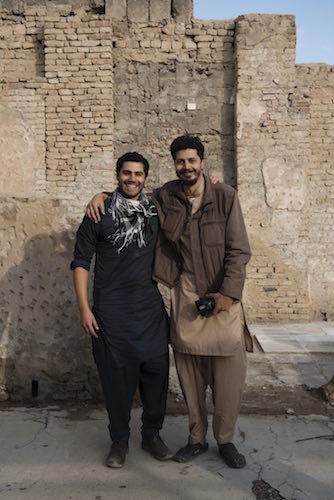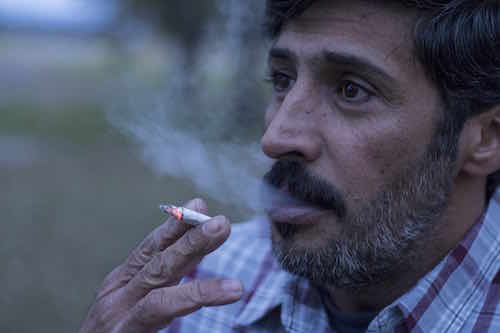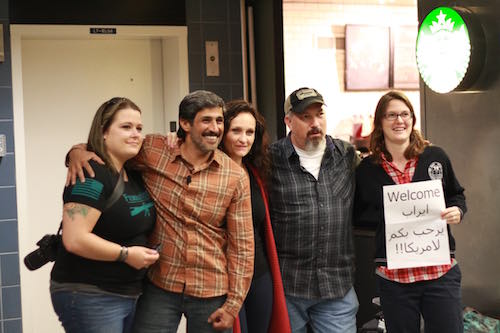Communiqué
“The Interpreters” Premieres on Independent Lens on Veterans Day, November 11 at 10
< < Back toThe Interpreters Premieres on Independent Lens on Veterans Day
Monday, November 11, 2019, on PBS and PBS.org
Iraqi and Afghan Interpreters Who Risked Their Lives for the U.S. Military Struggle to Find Safety for Themselves and Their Families

During the wars in Iraq and Afghanistan, more than 50,000 local interpreters helped protect U.S. military forces on the ground, enabling them to communicate with the local population. But those who took the job were often considered traitors. In the aftermath of war, some have been able to leave their home countries and reach safety, while others still languish in hiding and fear for their lives. Filmed over the course of two years The Interpreters follows three of these men, each of whom faces an impossible dilemma: remain in place and wait for paperwork that may never arrive or attempt a hazardous exit route to Europe. As the years go by, hope dwindles for the thousands of interpreters still seeking the protection they were promised for their sacrifice. Directed by Andrés Caballero and Sofian Khan, The Interpreters premieres on Independent Lens on Veterans Day, Monday, November 11, 2019, 10:00-11:00 PM ET on PBS, PBS.org and the PBS Video app.
“Phillip Morris” — whose chain-smoking earned him the nickname — served in Iraq alongside Paul Braun, a sergeant in the Minnesota National Guard who became his best friend. After coalition forces withdrew in 2011, Phillip and his family came under threat.
Paul, back home to Minneapolis, works tirelessly on behalf of Phillip to help him obtain a Special Immigrant Visa (SIV). This 2008 program was created by the U.S. to help interpreters like Philip, but the process has been marred by long delays and backlogs; so far, only a fraction of the tens of thousands of interpreters who were left behind have received visas. Growing anti-refugee rhetoric has also put the future of the program in jeopardy.
Fortunate to have an American soldier advocating on his behalf, Phillip is finally able to make it to the U.S. in 2013. But his family’s paperwork is delayed, and they’re forced to stay behind in Iraq amidst the rising threat of ISIS. While Phillip acclimates to life in America, he waits anxiously for his family to join him. Eventually he must go back to complete their paperwork, once again facing the threat of being a marked man in his country.
Malik is an active interpreter with the Americans at the Air Force base in Kabul and has been waiting for his Special Immigrant Visa for nearly four years. Incredibly, he has the security clearance to continue working on the base alongside U.S. troops but is stuck in the security review stage of the visa process. Every trip back and forth to the base is dangerous. To ensure his family’s safety, Malik moves with his wife and two children from his father-in-law’s house to his sister’s house to his uncle’s house every few days.

Mujtaba is an Afghan interpreter who worked with the Army and the DEA fighting drug traffickers. Fearful for his life and too impatient to wait any longer for his visa, Mujtaba and his family leave for Turkey. While attempting to cross the Aegean Sea to Greece with the help of smugglers, a tragic accident sets him on a path he never imagined.
“The Interpreters has all the heartache and danger of a political thriller,” said Lois Vossen, Executive Producer of Independent Lens. “The story exposes the political twists and turns of our complex asylum and immigration system for interpreters who supported and saved the lives of American troops in Afghanistan and Iraq. Ultimately, the question we’re asked to answer is: What is owed to the people who put themselves and their families on the line in service to America, and who deserves a place in this country?”
Visit The Interpreters page on Independent Lens, which features more information.
About the Filmmakers
 Andrés Caballero (Director, Producer) is a Los Angeles-based filmmaker, journalist and public radio producer. His stories appear on NPR’s “StoryCorps,” “Latino USA,” “Morning Edition,” “Weekend Edition,” PBS, Deutsche Welle, and the BBC. A former NPR/Above the Fray fellow, Andrés reported stories from Cameroon and the Central African Republic. He co-directed Gaucho del Norte (2015), an observational documentary that follows the journey of a Patagonian immigrant sheepherder recruited to work in the American West. Andrés is also a 2016 MacArthur Documentary Grant recipient for The Interpreters. He produced An Act of Worship, a short about the Muslim ban in collaboration with Laura Poitras’ Field of Vision. He currently serves on the board of the Americas Media Initiative, an organization that supports independent filmmakers in Latin America.
Andrés Caballero (Director, Producer) is a Los Angeles-based filmmaker, journalist and public radio producer. His stories appear on NPR’s “StoryCorps,” “Latino USA,” “Morning Edition,” “Weekend Edition,” PBS, Deutsche Welle, and the BBC. A former NPR/Above the Fray fellow, Andrés reported stories from Cameroon and the Central African Republic. He co-directed Gaucho del Norte (2015), an observational documentary that follows the journey of a Patagonian immigrant sheepherder recruited to work in the American West. Andrés is also a 2016 MacArthur Documentary Grant recipient for The Interpreters. He produced An Act of Worship, a short about the Muslim ban in collaboration with Laura Poitras’ Field of Vision. He currently serves on the board of the Americas Media Initiative, an organization that supports independent filmmakers in Latin America.
Sofian Khan (Director, Producer, Cinematographer) is the founder of Capital K Pictures, a New York-based production house. His short work has appeared on Field of Vision, The Fader, Al Jazeera, NBC and The Atlantic Selects. Sofian is a 2016 MacArthur Documentary Grant recipient for The Interpreters, completed with support from ITVS, the Tribeca Institute and Firelight Media. His previous feature-length collaboration with Andrés Caballero, Gaucho del Norte — following South American sheepherders who are recruited to work in the American West — made its broadcast premiere on public television’s America ReFramed series in 2015. Currently, Sofian is producing An Act of Worship, based on a short he co-directed for Field of Vision about the 2017 travel ban. It has received support from Ford Foundation’s JustFilms, Chicken & Egg and Made in NY, amongst others. Sofian is a current Sundance Institute Creative Producing Fellow and is developing several new projects under the Capital K Pictures banner.
CREDITS
Directed by Andrés Caballero and Sofian Khan
Produced by Sofian Khan, Andrés Caballero, Mark Steele, Simon Taufique
Executive Producers Sally Jo Fifer, Lois Vossen, Carrie Lozano
Supervising Producer Shana Swanson
Cinematography by Sofian Khan
Edited by Francisco Bello, Fabian Caballero

